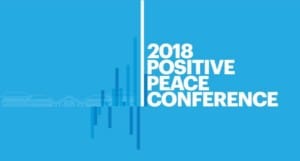Published in 2018 Postive Peace
Positive Peace provides a new way of conceptualizing development by placing the emphasis on what creates a thriving society, reframing our focus towards what works. There are tremendous benefits – economic, political, social and beyond – to making sound investments in building peace rather than merely preventing and mitigating conflict.
The 2018 Positive Peace Conference will build upon two successful conferences, bringing together leading experts in Positive Peace: the attitudes, institutions and structures that prevent violence. Practitioners, policymakers, members of the media, corporate leaders, and representatives of fields like conflict prevention and sustainable development, will come together to discuss new opportunities and challenges for strengthening Positive Peace.

November 5th – 6th, 2018
Graduate School of Business – Stanford University
What Creates Peace?
The tools for prevention exist, but we too rarely use them. Positive Peace can help change the conversation.
The Institute for Economics and Peace (IEP) has sought to better understand the drivers of peaceful societies through the development of an empirical framework that identifies the optimum environment in which peace can flourish. This is termed Positive Peace. The main contribution has been the development of a framework of inter-related factors, identified by analyzing over 9,000 different indices, datasets and attitudinal surveys. The eight pillars of Positive Peace identified by IEP that are associated with peaceful environments are:
Well-functioning government
Sound business environment
Equitable distribution of resources
Acceptance of the rights of others
Good relations with neighbors
Free flow of information
High levels of human capital
Low levels of corruption
Positive Peace provides a new way of conceptualizing development by placing the emphasis on what creates a thriving society, reframing our focus towards what works. High levels of Positive Peace are a cross-cutting factor for progress, making it easier for businesses to sell, entrepreneurs and scientists to innovate, individuals to produce, governments to effectively regulate, and citizens to peacefully resolve conflict.
Countries with higher levels of Positive Peace experience less violence, have stronger economies, and prove significantly more resilient to shocks. Changes in Positive Peace are associated with changes in a number of macroeconomic indicators – GDP growth, FDI and credit ratings. Countries with higher levels of Positive Peace are less likely to slip into major conflicts, are more likely to experience less violence, and are better equipped to bounce back from internal or external shocks caused by economic conditions, societal disagreements and natural disasters. In fact, 84% of major political shocks and 91% of violent civil resistance campaigns occurred in countries with lower levels of Positive Peace. Yet the dearth of both research on and fiscal investment in strengthening Positive Peace heralds the need for greater global attention. This urgency is underpinned by the reality that the world is becoming less peaceful.
The Americas region offers a window into these dynamics, including record levels of migration, rampant corruption, police violence, and environmental threats. Through the lens of Positive Peace, speakers will explore practical solutions emerging from countries including Venezuela, Brazil, Guatemala, and Mexico. We will also discuss applications of Positive Peace for policy planning and community building in the United States – at the local and national level.
Previous conference panels have spanned atrocity prevention and psychology; the role of civil society actors including grassroots advocates and the media in promoting peace; and how data can be most effectively harnessed for change. Considering that the Positive Peace framework offers a road map for peace to flourish over time, we hope you will join us in charting a path forward amidst some of the most pressing conflicts we face today, both at home and abroad. To learn more about last year’s conference, click here.
Find full 2018 Positive Peace Conference details including speakers, logistics and RSVP information HERE.

Thank you for sharing! Happy to provide further details if needed: [email protected]